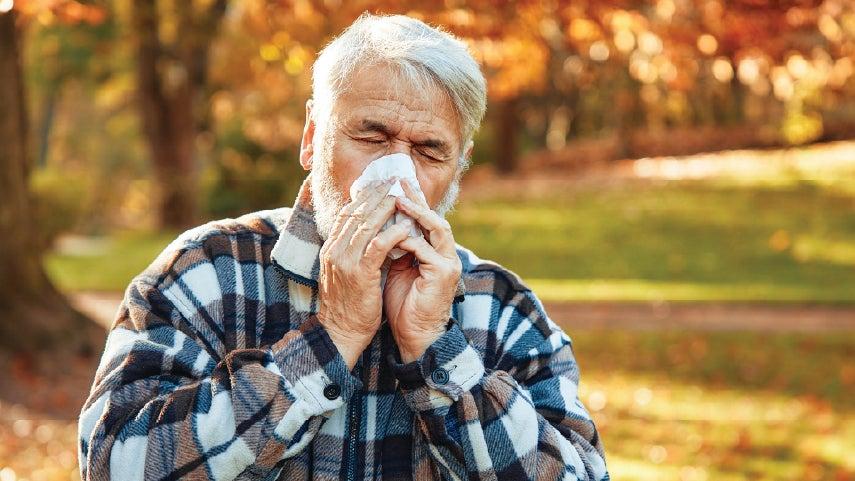
Related Topics
As the temperatures drop and the season of sniffles draws near, you may wonder whether getting the flu shot is worth it. Every year, the influenza (flu) vaccine is updated to protect against the most common strains circulating in the environment. And while its effectiveness can vary, this immunization remains one of the best ways to prevent serious flu illness and complications.
For older adults, the flu shot is particularly important. According to the Centers for Disease Control and Prevention (CDC), people age 65 and older accounted for 51% of hospitalizations and 68% of deaths during the 2023-2024 flu season.1 There are two main reasons we’re more vulnerable to the flu later in life. One is that aging causes our immune system to become less efficient at fighting viruses. In addition, we’re more prone to having one or more chronic conditions that can be worsened by influenza.
Let’s take a look at how the flu shot works, what it protects against, and why it’s a vital tool for staying healthy as we age.
What exactly is the flu vaccine?
Made from an inactivated form of the virus or virus components, the flu vaccine provides protection against infection with flu viruses. It’s designed to help your immune system recognize and fight these strains when you’re exposed to them at home or out in the community. Each year, the flu vaccine is reformulated to combat the strains predicted to be most common in the upcoming flu season.
The flu vaccine comes in several forms, including the standard flu shot, a high-dose version for older people, and nasal spray options for certain age groups. CDC recommends the flu shot for most people age 6 months and older, with specific guidance for older adults and people with weakened immune systems.
What flu does the vaccine prevent?
During the 2024-2025 flu season, all flu vaccines will be trivalent vaccines, which have been used in the U.S. for more than 50 years. This means they include vaccine viruses or viral proteins from three different flu strains: two influenza type A strains (H1N1 and H3N2) and one influenza type B strain. Previously, a quadrivalent version of the flu vaccine was used, but the influenza B/Yamagata strain was removed since it’s no longer detectable in the environment.
How effective is the flu shot for 2024-2025?
Flu shot efficacy can vary from year to year, depending on how well it matches circulating strains. However, it typically ranges from 40-60%.
Even if flu vaccine effectiveness dips below this range in a given year, it still offers essential protection that can keep you from getting seriously ill. A 2021 study showed that among adults, vaccination was associated with a 26% lower risk of flu-related intensive-care unit (ICU) admission and a 31% lower risk of flu-related death compared to those who did not receive the flu vaccine.2
According to CDC, vaccination against the flu has also been linked to:
- Lower rates of hospitalization for people with chronic lung disease and diabetes
- Lower rates of certain cardiac events among people with heart disease, particularly for those who have experienced a cardiac event (e.g., heart attack) in the past year
- Reduced risk of flu-related complications from chronic lung disease (e.g., chronic obstructive pulmonary disease/COPD) resulting in hospitalization
Should seniors get a different flu shot?
CDC and the Advisory Committee on Immunization Practices (ACIP) recommend adults age 65 and older receive one of three high-dose flu vaccines over standard-dose options, since these may offer stronger protection. The high-dose vaccines include:
- Fluzone High-Dose flu vaccine
- Flublok Recombinant flu vaccine
- Fluad Adjuvanted flu vaccine
If a higher-dose or adjuvanted vaccine is not available when you go to get your flu shot, you should opt for any other age-appropriate flu vaccine instead. Note: Nasal spray flu vaccines are not advised for older adults.
How long does the flu vaccine take to be effective?
Once you receive the flu shot, it typically takes about two weeks for your immune system to build up enough antibodies to protect against the virus. By getting your flu shot at the start of the season, such as in September or October, you can ensure you’re protected before flu activity peaks in the winter months. But if you miss this window, don’t worry! Since flu season typically runs through May, it’s still worth getting your shot a bit later in the season.
How long does the flu shot protect you?
Generally, the flu shot provides protection for up to six months, which will cover you for most of the flu season. But after that timeframe, your immunity will decline. By next season, you’ll no longer be protected by your previous vaccine, and different strains may be circulating. That’s why CDC recommends everyone age 6 months and older get an updated flu shot every year.
Does the flu shot protect against a cold?
No. While flu and the common cold can have similar symptoms, they’re caused by different viruses. Since the flu vaccine is designed to protect specifically against influenza, it won’t shield you from cold viruses (e.g., rhinoviruses), COVID-19, or other flu-like illnesses such as respiratory syncytial virus (RSV). That’s why it’s important to get vaccinated against COVID and other preventable illnesses that affect older adults.
Can the flu vaccine give you the flu?
No. Since it’s made with inactivated (killed) virus, the flu shot will not cause you to develop the flu. “While you may have some minor side effects from the vaccine—like redness at the injection site, muscle aches, slight fever, or mild fatigue, it cannot make you sick with the flu,” said Kathleen Cameron, former Senior Director of NCOA’s Center for Healthy Aging.
In fact, vaccination greatly reduces your chances of getting infected with the virus and developing debilitating illness and complications,” Cameron said.
So what causes feelings of mild illness after the flu shot? Your immune system. While not everyone experiences them, side effects are positive signs your body is starting to do what it should: build immunity against the virus. They should last no more than a day or two.
Have you gotten your updated flu and COVID vaccines?
The best way to prevent the flu and COVID is to stay up to date with your vaccines. Here are three great reasons to schedule your appointment today with your doctor, pharmacy, or community health clinic:
- While vaccines reduce your risk of getting infected, they also make symptoms milder if you do get a breakthrough infection.
- You can get your flu and COVID shots at the same time, which gives you powerful protection against two dangerous illnesses. And soon, you may be able to get a single vaccination that covers both viruses.
- Medicare covers 100% of the cost of the flu and COVID vaccines as well as other immunizations recommended by ACIP. That means you’ll pay nothing at your visit.
Find a vaccination site near you at Vaccines.gov, and learn about other vaccines for older adults that are fully covered by Medicare and Medicaid.
Sources
1. Centers for Disease Control and Prevention (CDC) - Influenza (Flu). Influenza Activity in the United States during the 2023–2024 Season and Composition of the 2024–2025 Influenza Vaccine. Found on the internet at https://www.cdc.gov/flu/whats-new/flu-summary-2023-2024.html
2. Jill M. Ferdinands, et. al. Does influenza vaccination attenuate the severity of breakthrough infections? A narrative review and recommendations for further research. Vaccine. June 23, 2021. Found on the internet at https://www.sciencedirect.com/science/article/pii/S0264410X21005624?dgcid=author%20



